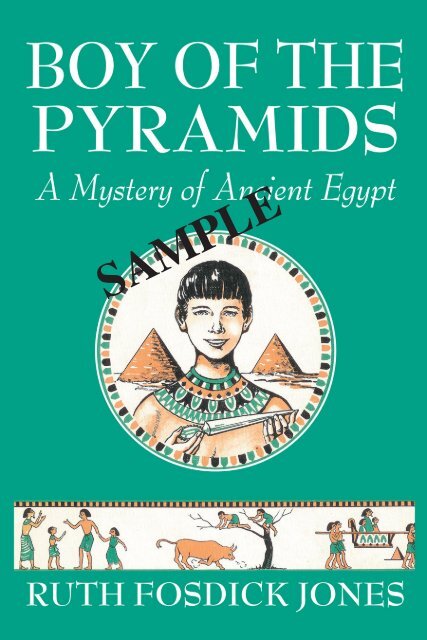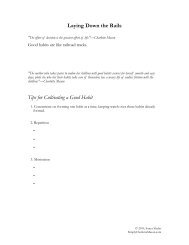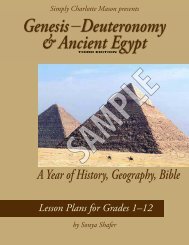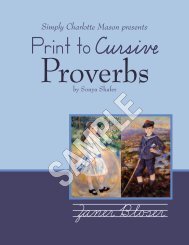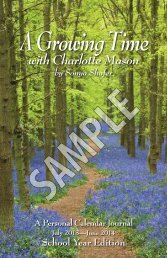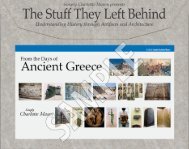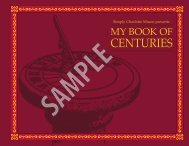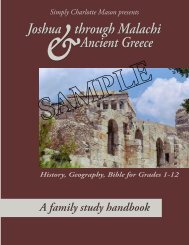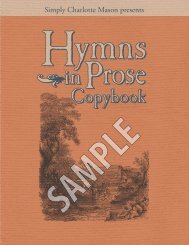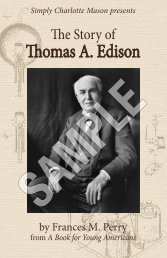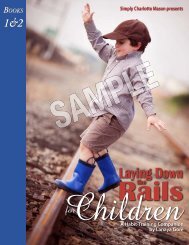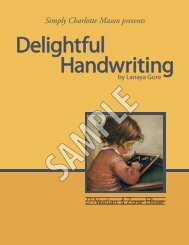Boy Of The Pyramids, Sample.pdf - Simply Charlotte Mason
Boy Of The Pyramids, Sample.pdf - Simply Charlotte Mason
Boy Of The Pyramids, Sample.pdf - Simply Charlotte Mason
You also want an ePaper? Increase the reach of your titles
YUMPU automatically turns print PDFs into web optimized ePapers that Google loves.
SAMPLE
<strong>Boy</strong> of the <strong>Pyramids</strong> . . .<br />
• Gentle, Yet Exciting, Mystery—No murders or grizzly<br />
mummy stories here!<br />
• Appropriate—Deals with some of the potentially sordid<br />
details of this ancient culture in a manner totally<br />
appropriate for young children.<br />
• Comprehensive—Masterfully weaves many aspects of<br />
Ancient Egypt into the story line.<br />
• Illustrated—<strong>The</strong> beautiful pen and ink drawings do as<br />
much to help children learn about Ancient Egypt as the<br />
story does.<br />
• Award-Winning—Written by Ruth Fosdick Jones and<br />
originally published in 1950, this book won the Jack and<br />
Jill Prize Contest. We’re thrilled to make it available for a<br />
new generation of students to enjoy!<br />
• Recommended—Listed as the main suggested resource for<br />
younger children (grades 1–3) in the Ancient Egypt study<br />
(History Module 2) on the SCM Curriculum Guide<br />
• Convenient—Published in both electronic format (e-book)<br />
and printed paper format!<br />
Thank you for your interest in <strong>Boy</strong> of the <strong>Pyramids</strong>.<br />
We hope you enjoy the first chapter of this<br />
delightful mystery of Ancient Egypt!<br />
Visit www.<strong>Simply</strong><strong>Charlotte</strong><strong>Mason</strong>.com<br />
to order the complete<br />
<strong>Boy</strong> of the <strong>Pyramids</strong> today!
<strong>Boy</strong> of the<br />
<strong>Pyramids</strong><br />
A Mystery of Ancient Egypt<br />
By Ruth Fosdick Jones<br />
Illustrated by Dorothy Bayley Morse
<strong>Boy</strong> of the <strong>Pyramids</strong>: A Mystery of Ancient Egypt<br />
This edition copyright © 2007 <strong>Simply</strong> <strong>Charlotte</strong> <strong>Mason</strong>, LLC<br />
All rights reserved.<br />
Published in 2007 by<br />
<strong>Simply</strong> <strong>Charlotte</strong> <strong>Mason</strong>, LLC<br />
P.O. Box 892<br />
Grayson, Georgia 30017-0892<br />
Available at www.<strong>Simply</strong><strong>Charlotte</strong><strong>Mason</strong>.com
Contents<br />
1 Fourteen Copper Rings 5<br />
2 <strong>The</strong> Slave Market 15<br />
3 Red <strong>Boy</strong> 29<br />
4 <strong>The</strong> Harvest 37<br />
5 <strong>The</strong> Flood 55<br />
6 At Gizeh 71<br />
7 <strong>The</strong> Green Stone 83<br />
8 Sneferu’s Pyramid 95<br />
9 <strong>The</strong> End of It All 113
1<br />
Fourteen Copper Rings<br />
<strong>The</strong> sun, rising over the desert cliffs, shone across<br />
the green valley of Egypt and the broad River Nile right<br />
into Kaffe’s eyes. It woke him up, and Kaffe didn’t like<br />
to be waked that way. He scowled. <strong>The</strong>n he sat up in bed<br />
with his eyes still shut tight. “Num!” he called. “Num!”<br />
<strong>The</strong>re was no answer, so he tried again, louder this<br />
time: “Num, draw the curtains!”<br />
Still no answer came. Suddenly Kaffe heard<br />
something that sounded very much like a snore. He<br />
forgot that he was going to stay sleepy so that he could<br />
5
take another nap after Num had drawn the curtains to<br />
keep out the sun. He opened his eyes and bounced out of<br />
bed, and there was Num, his black body shining in the<br />
sunlight, snoring peacefully on the reed mat at the foot<br />
of Kaffe’s bed.<br />
“Num,” cried Kaffe. “Get up!” He put out his foot to give<br />
the Negro a kick in the ribs. People weren’t considerate<br />
of their servants long ago in Egypt, and anyway, Num<br />
was a slave. He wasn’t used to consideration.<br />
But Kaffe’s foot stopped short just before it touched<br />
Num’s ribs. Beyond the slave was a cedarwood chair,<br />
and folded carefully on the chair was Kaffe’s kilt of fine<br />
white linen. Not his everyday kilt, but his best one, with<br />
his copper-and-turquoise collar laid on top of it.<br />
When he saw that, Kaffe remembered everything<br />
and forgot to be cross because Num had overslept and<br />
let the sun shine in his eyes. For this was the day his<br />
father was taking him to Memphis to spend the copper<br />
rings he had been saving.<br />
Altogether, Kaffe had fourteen copper rings. He<br />
was very rich for a ten-year-old Egyptian boy. That<br />
was because his father had given him two fields. <strong>The</strong><br />
harvest from them belonged to Kaffe, and his father had<br />
paid him eight copper rings for his first harvest, and six<br />
for his second. And that very morning he was going to<br />
the great city of Memphis to spend the copper rings, all<br />
fourteen of them.<br />
With a whoop Kaffe bounded over Num, out of his<br />
room, through the house and into the garden. By the<br />
6
time Num had risen sleepily to his feet wondering what<br />
all the noise was about, Kaffe was splashing joyfully in<br />
the garden pool.<br />
He wondered what he could buy for fourteen copper<br />
rings. He had never bought anything before.<br />
“Let’s see,” he said aloud. “I might buy a new ball. A<br />
husk ball covered with leather. But that wouldn’t cost<br />
very much. Maybe I could get one of the wooden bakers<br />
that kneads dough if you pull a string—or I could get<br />
Mother a new bracelet.”<br />
<strong>The</strong>n suddenly he had an idea, such a wonderful idea<br />
that he dove under water and kicked his feet in the air.<br />
“I shall buy a dagger,” he said to himself. “One with a<br />
gold handle and a flint blade, or maybe a copper blade.<br />
A real dagger.” None of the boys he knew had one, but<br />
then, none of them owned two fields like Kaffe. “And,”<br />
he added, “if it doesn’t cost too much, I’ll get the wooden<br />
baker, too.”<br />
Blowing and spluttering, Kaffe stuck his head out of<br />
water, only to have it pushed swiftly under again.<br />
“What——,” he began as soon as he could speak.<br />
“Look out,” said a voice above him, “or the crocodile<br />
will get you!”<br />
Kaffe winked the water out of his eyes. His father,<br />
Socharis, was standing on the edge of the pool. “And I<br />
suppose it was the crocodile who ducked me,” answered<br />
Kaffe, laughing. <strong>The</strong>n he saw his father’s kilt, all freshly<br />
pleated, and his newly curled wig, and the black, false<br />
beard that Socharis wore whenever he went away<br />
7
anywhere. “Oh, Father,” Kaffe cried, “you are ready to<br />
go. You’ll wait for me, won’t you?” He scrambled out of<br />
the pool.<br />
“<strong>The</strong>re is no hurry,” answered Socharis. “We shall<br />
eat our breakfast here while you dry yourself in the<br />
sun.” He clapped his hands. Almost like magic a slave<br />
appeared, carrying a big bowl of dates, figs, bananas<br />
and grapes. Behind him came two more slaves, one with<br />
a bowl of milk for Kaffe, and the other with a plate of<br />
wheat cakes. This was their breakfast.<br />
“Now, Kaffe,” said his father when they had finished,<br />
“as soon as you are dressed, we can start. I shall tell the<br />
slaves to get the boat ready.”<br />
Kaffe ran into the house and burst into his room. Num<br />
was there waiting to hand him his kilt and necklace and<br />
help strap on his papyrus sandals. That was all Kaffe<br />
wore, so it did not take him long to get dressed. He was<br />
ready in almost as short a time as it takes to tell it.<br />
On a little stand near the door was an ebony box with<br />
a border of lotus and papyrus flowers carved around the<br />
sides and the figures of the god and goddess of the Nile<br />
on the top. In this box Kaffe kept his copper rings. He<br />
opened it and counted them to be sure that they were<br />
all there, then snatched it up and ran from the room.<br />
At the garden door he stopped. Just outside two people<br />
were talking, and they were talking about him.<br />
“It is a great deal of money for a little boy to spend.”<br />
That was Nasha, his mother. Kaffe sighed. He thought<br />
he had better not tell her about wanting to buy a dagger.<br />
8
He didn’t think she would like it.<br />
“Now, don’t worry, Nasha,” he heard his father say.<br />
“It will turn out all right.”<br />
“I hope so,” she answered. “But don’t let him spend<br />
all those rings foolishly, will you, Socharis?”<br />
“Certainly not. Certainly not,” replied Socharis.<br />
“Where is that boy?” he asked, looking around.<br />
“Here I am, Father,” called Kaffe, running out of the<br />
house. “Good morning, Mother.”<br />
“Good morning, Son.” Nasha bent down to kiss him.<br />
One hand, with the fingers dyed henna color, rested<br />
lightly on his shoulder. Kaffe thought she was very<br />
beautiful. Her hair, without her wig, was short and<br />
black like his. <strong>The</strong> green paint around her eyes made<br />
them look very large and dark, and she wore a soft green<br />
robe over her white linen dress.<br />
“What are you going to buy in Memphis, Kaffe?” she<br />
asked.<br />
Kaffe had been afraid she would ask that. “Oh,<br />
something very fine,” he answered. “It’s to be a surprise.<br />
You’ll see when we get home.” He hopped first on one<br />
foot, then on the other. “Can we go now, Father?” he<br />
asked.<br />
“Yes, I think the boat is ready.” Socharis picked up<br />
his gold-headed staff and turned to leave.<br />
“Good-bye, Mother,” shouted Kaffe, and tore down the<br />
garden path to the big stone gateway on the river bank<br />
before Nasha had time to ask any more questions.<br />
Beyond the gateway was the boat. It was a very<br />
9
gay boat. <strong>The</strong> rails and even the big steering oar were<br />
painted brightly in blue and red and black and white.<br />
In the stern was a painted canopy under which Socharis<br />
and Kaffe could sit out of the sun. Twelve slaves were<br />
already bowed over their oars in the middle of the boat,<br />
and as Socharis came down the steps, other slaves were<br />
making fast a smaller boat with a cloth-covered cabin<br />
that they would tow down the river after them. This<br />
was the kitchen boat, and on it were still more slaves<br />
and reed baskets of food to be cooked for their dinner.<br />
Socharis stepped on board and sat down under<br />
the canopy. Num followed with the litter they would<br />
need to carry them through the streets of Memphis.<br />
<strong>The</strong> steersman shouted an order, the slaves pulled on<br />
the oars and began their singsong chant, and the boat<br />
swung out into the river.<br />
Kaffe looked back at the shore. Only the tops of the<br />
trees and the awning over the flat roof of the house<br />
showed above the high garden wall. Outside the wall<br />
were fields where many slaves were working in the hot<br />
sun. <strong>The</strong>re was one field quite near the river with a<br />
big fig tree growing in the very center. That was one<br />
of Kaffe’s fields. His other field was next to it, farther<br />
away from the river, and far off behind them both rose<br />
the yellow cliffs at the valley’s edge. Beyond them was<br />
the desert.<br />
Soon the house and the field with the fig tree in the<br />
center were hidden from sight behind a bend in the river.<br />
Kaffe sat down beside Socharis on a low stool. “Where<br />
10
are we going first when we get to Memphis?” he asked.<br />
He hoped his father would say that he could decide,<br />
but Socharis said, “I have an errand to do at the slave<br />
market. I need a new field hand and another woman for<br />
your mother.”<br />
“Oh,” said Kaffe. He was disappointed. He did not<br />
like to go to the slave market. Sometimes the slaves<br />
cried when they were separated from their families.<br />
This often happened when one man wanted one part of<br />
a family and another man wanted another part. Kaffe<br />
wondered if the trip to Memphis was going to be as<br />
much fun as he had thought.<br />
But it was pleasant on the river. <strong>The</strong>y passed little<br />
villages and houses like the one Kaffe lived in, and<br />
tall marshes of papyrus plants. <strong>The</strong>se were reeds from<br />
which paper and ropes and sandals were made. <strong>The</strong>n<br />
there were all kinds of boats to watch. One that sailed<br />
past them carried a mummy case painted in bright<br />
colors and decorated with gold. This was a funeral boat<br />
and the mummy case was a coffin made in the shape<br />
of a man’s figure. <strong>The</strong> slaves that rowed the boat were<br />
chanting mournfully.<br />
“Are they going to Gizeh where Khufu is building his<br />
pyramid, Father?” asked Kaffe. Khufu was the pharaoh<br />
of Egypt, the king who ruled over the whole Nile valley<br />
and all the people in it down to the very last slave. Most<br />
of the rich noblemen of the country were buried around<br />
the great tomb that he was building for himself.<br />
“Yes. <strong>The</strong>y probably are going to Gizeh,” said Socharis<br />
11
in answer to Kaffe’s question.<br />
After the funeral boat had passed them, they met a<br />
nobleman whom Socharis knew, bound up the river for<br />
a picnic. <strong>The</strong>n they began to see fishing boats floating<br />
down to the marshes at the river’s mouth, and trading<br />
boats from far up the Nile, low in the water with their<br />
cargoes of ivory and ebony and gold. As they drew near<br />
Memphis, the river seemed alive with boats. It was fun<br />
to be with Socharis, because he could always tell what a<br />
boat had in it if he knew where it came from.<br />
Kaffe pointed to a big boat. “Where is that one from?”<br />
he asked. He knew that it must have come from far<br />
away, for it was big enough to have a mast and sail as<br />
well as oars.<br />
“It has come from Syria with a load of cedarwood,”<br />
answered Socharis. “You can smell it, Kaffe.” And Kaffe<br />
could. <strong>The</strong> air was spicy with the smell of the wood.<br />
“That smaller boat over there,” Socharis went on,<br />
“brings copper from Sinai.” Soon he had told Kaffe<br />
where all the boats came from and what goods they<br />
were carrying.<br />
All the bigger boats seemed to be trying to land<br />
at once. Sailors shouted at each other, oars scraped<br />
together, and every so often there was the sharp snap of<br />
an overseer’s whip on a slave’s bare back. Socharis’ boat<br />
threaded its way toward shore. <strong>The</strong> slaves shipped their<br />
oars, and the boat slid quietly up to the landing stairs.<br />
<strong>The</strong>n the litter was set down on the ground so that<br />
Socharis and Kaffe could step in. This was a kind of<br />
12
chair that was carried on poles by four slaves, and there<br />
was plenty of room in it for Kaffe and Socharis to sit side<br />
by side. When they had settled themselves comfortably,<br />
the slaves picked up the carrying poles and away they<br />
went toward the market place with Num running ahead<br />
to clear a way for them through the narrow, crowded<br />
streets.<br />
13


